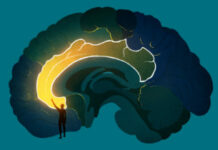The Psychedelic Miracle
From Rolling Stone Magazine: Both the underground practice of and aboveground research on the use of psychedelic drugs to heal PTSD, as well as depression, anxiety,...
Using Shakespeare to Ease the Trauma of war
From The New York Times: Learning Shakespeare can be a valuable way for veterans to begin to understand and heal from the trauma of war.
Article →
Patients More Likely to Refuse Drug-Only Treatment, Study Finds
The American Psychological Association (APA) recently published a study finding that patients assigned to drug-only treatments were more likely to refuse treatment, and more likely to drop out before treatment completion, than patients assigned to psychotherapy only.
This is Solitary
In this piece for The Atlantic, Natalie Chang explores the devastating psychological trauma of solitary confinement.
"That is the legacy and the cost of solitary confinement: The...
How Trauma Lodges in the Body
In this episode of On Being, psychiatrist Bessel van der Kolk discusses the role that bodywork including yoga and eye movement therapy can have...
DARPA’s Brain Chip Implants: Breakthrough or Total Disaster?
From Gizmodo: Some researchers believe that deep brain stimulation - a surgical procedure involving the implantation of electrodes that send electrical signals to specific areas...
In a Traumatised World, is Psychedelic Therapy our Best Hope?
From VolteFace Magazine: MDMA-assisted psychotherapy can play a major role in helping people heal from the effects of trauma.
"The results really are incredible and I’ve had...
Patient Race Associated with Varied Psychiatric Treatment Experiences
Findings point to association between race and the mental health care experiences of African-American and White veterans.
“FDA Agrees to New Trials for Ecstasy as Relief for PTSD Patients”
Last week, the FDA gave permission for ecstasy to move into Phase 3 clinical trials for the treatment of PTSD. “If they can keep...
“Is Time Outdoors the Key to Helping Veterans Overcome PTSD?”
Abbie Hausermann, MSW, LICSW, discusses why ecotherapy works for former service members. “The aim of these ecotherapy programs and services is to connect veterans...
VA Hospitals Perform Worst on Inpatient Psychiatric Care
The results of the cross-sectional study show that U.S. Department of Veterans Affairs (VA) owned hospitals perform worst on most measures.
“Veterans’ PTSD and Brain Injury Deserve Focused Research on New Treatments”
For STAT, Magali Haas reports on a research summit organized to improve the treatments available for PTSD. “If the goals are ambitious, the obstacles...
What Would a Trauma-Informed Society Look Like?
Imagine if we, as a society, started recognizing trauma, pain, grief, fear, the need for connection and understanding, and oppression without defensiveness or denial. What if, hypothetically, we saw the signs in people who were "defiant," "withdrawn," "oppositional," "depressed," "manic," or otherwise as desperate pleas to have their needs met, and stopped telling them they were sick for doing so? What would a society that actually encouraged expression of emotion, compassion, and empathy look like?
Mental Health in Black and White
When I looked through my mountains of medical records, I saw that the providers who listed my race as black applied diagnoses like major depressive disorder and PTSD. The providers who saw me as white preferred diagnoses of panic disorder and borderline personality disorder. Of course, my experiences are just anecdotal. But if racial bias due to subjective experiences of practitioners can play such a large role in mental health diagnostics, how is this even considered a scientific discipline?
Childhood Trauma Predicts Lack of Response to Antidepressants
Research in Translational Psychiatry finds that childhood maltreatment and trauma predict a greater likelihood of developing chronic depression, and a reduced likelihood of responding to treatment...
Intensive Care Patients at High Risk for PTSD, Psychiatric Symptoms
People who survive life-threatening illnesses in the intensive care unit (ICU) of a hospital are at high risk for depression and anxiety and nearly...
Victim Blaming: Childhood Trauma, Mental Illness & Diagnostic Distractions?
Why, despite the fact that the vast majority of people diagnosed with a mental illness have suffered from some form of childhood trauma, is it still so difficult to talk about? Why, despite the enormous amount of research about the impact of trauma on the brain and subsequent effect on behaviour, does there seem to be such an extraordinary refusal for the implication of this research to change attitudes towards those who are mentally ill? Why, when our program and others like it have shown people can heal from the effects of trauma, are so many people left with the self-blame and the feeling they will never get better that my colleague writes about below?
“The Drugs That Built a Super Soldier”
"During the Vietnam War, the U.S. military plied its servicemen with speed, steroids, and painkillers to help them handle extended combat,” Lukasz Kamienski writes...
“Brain Changes Seen in Veterans with PTSD after Mindfulness Training”
Veterans with PTSD experience observable changes to the brain after mindfulness training, according to new research published in Depression and Anxiety. “The brain findings suggest...
“Transgender Veterans Have High Rates of Mental Health Problems”
A new study finds that ninety percent of military veterans who identify as transgender have at least one mental health diagnosis. “Traumatic brain injuries...
“Psychiatric Drugs and Veteran Suicides”
US Congressman David Jolly has introduced a bill calling for studies on the link between veteran suicides and psychiatric drugs. The International Society for...
Minority Discrimination Linked to Psychosis
A study published in this month’s issue of the Social Psychiatry and Psychiatric Epidemiology found that perceived discrimination related to minority status may precede...
“Soldiers at War in Fog of Psychotropic Drugs”
“In a small but growing number of cases across the nation, lawyers are blaming the U.S. military's heavy use of psychotropic drugs for their...
“Veterans Let Slip the Masks of War: Can This Art Therapy Ease PTSD?”
“Service members suffering from PTSD often feel like they’re wearing a mask,” Samantha Allen writes in Invisible Wounds. Melissa Walker, an art therapist, asks them to make one. “The results are stirring. One mask, striped in red and black with hollow chrome-colored eyes, is wrapped in razor wire with a lock where its mouth should be.”
“’Blind Spot’ for Civilian PTSD”
Speaking to Medscape about PTSD, Jeffrey Lieberman likens our current treatments with SSRIs, tricyclics and therapy to "treating tuberculous by putting people in sanitariums or polio with iron lungs, or Alzheimer's disease with these cholinomimetic drugs.” "They are symptom-improving, but they're not disease-modifying,” he adds. “They're just not sufficient…”





















